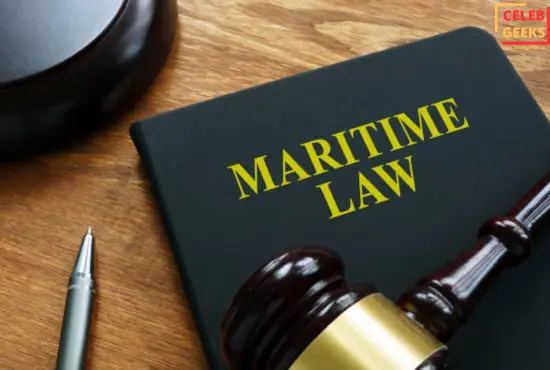The houston maritime attorney serves an essential role in today’s world economy. Houston and Texas are the biggest hub geographies for naval activity across the United States of America. Houston has become an important hub for shipping, oil, gas, and other maritime industries. It is located near the Gulf of Mexico and with one of the world’s busiest ports. Working in the maritime industry has risks associated with it. These are some of the legal issues that people working within the maritime sector have faced. Accidents on vessels to a legal tussle over cargo, offshore injuries, and environmental regulations. Therefore, a Houston maritime lawyer is essential to handle this.
The Role of a Houston Maritime Attorney

A Houston maritime lawyer has experience in maritime law, who deals with cases involving shipping, navigation, and marine resources. Maritime law also called admiralty law handles issues about personal injury claims to contract disputes on matters involving maritime activities.
These houston maritime attorneys are knowledgeable about different laws and legal contracts governing maritime activities. They are fully aware of particular challenges relating to flag state jurisdiction, intricate issues of quotas, and moratoriums regarding sea mammals. They understand and keep in mind how life and professionals work on the ocean. Maritime law is complicated and consists of a mix of international, federal, and state laws. An attorney in maritime law fights for his client’s rights and ensures that the latter gets fair compensation for damages, injuries, or losses suffered because of such mishaps.
The Basics of Maritime Law

Maritime law was developed from many sources, including federal statutes and general maritime law. In turn, the sources have provided the theories of maritime law that are involved in most of the cases to do with the vessels and their crew and passengers.
Maritime law defines quite a good number of the most fundamental legal principles supporting the sea and its proponents; these include
Seaman’s Right to Maintenance & Cure
A seaman receives benefits, and a cure from the time of injury until he recovers and is fit to return to work. However, there exists maximal medical improvement in case scenarios that could affect the amount of compensation to be received. In under observation, he may receive the costs of a seaman’s rent, utilities, property taxes, homeowner’s insurance, and food. Recovery matters in workers’ compensation insurance for employees and covers the cost of treatment. A seaman is a master or crew member of a vessel in navigation. Maintenance and cure also have benefits of workers’ compensation- there is no requirement that the seaman prove any fault for the injury-the employer must pay.
The Jones Act
The Jones Act is a federal law that grants seamen the basic right to file a lawsuit against their employer in court for injury damage. On the other hand, for the eligible Jones Act, a seaman will spend more than 30% of his time working on a vessel. It reduced the standard of proof under the Jones Act required for causation between employer negligence and injury to a seaman. However, it also extends the statutory rights of a seaman to bring an action against his employer. The Jones Act also has some features of the Federal Employment Liability Act. As an illustration, for example, a Jones Act claim is generally not removable to federal court if it is filed in state court.
Death on the High Seas Act
In some cases when death happens due to someone’s negligence or any other wrongful act on the high seas. DOHSA ensures an estate representative of a deceased person can recover a claim.
Saving to Suitors Clause
Federal law expands navy and maritime jurisdiction merely to the federal district courts. In addition to this, the language of a statutorily created right is contrary under the Jones Act to the saving to suitors clause. All nonadmiralty remedies are saved to clause saves to a plaintiff by “saving to suitors.” A classic admiralty remedy is a lawsuit in which the plaintiff brings his cause of action directly against the ship.
Harbor Worker’s nd Longshore Compensation Act
Federal law has given some statutory rights to employees, not necessarily “seamen,” who inspect ships that are dry-docked. This law includes longshoremen, shipbuilders or breakers, ship repairers, and construction workers in harbors. Injuries can occur on open waters or an approved adjacent area, such as a pier or dock. Under this law, with the help of houston maritime attorney compensation, medical care, and survivor’s benefits may be paid if an injured employee is killed.
Maritime Law Apply
Most of the time, maritime law got activated on those incidents that happen on the high seas and accidents happening beyond the territorial waters of any country. It extends its application into the national seas which are the waters within 12 miles of the shore. However, when it comes to the provincial application, the law is not clear. This early period applied maritime law only to the incidents that occurred beyond the “body of the country”. The Great Lakes and other inland nontidal waters are excluded. However, by the end of the 19th century, this exclusion gradually disappears.
For navigable waters
If the way of water is found navigable either alone or in combination with other waters, then commodity exchange can be made safe and presumably. Thus, if water completely forms an inland water body in one state, then water is not navigable for purposes of admiralty jurisdiction. The bottom line test is that commerce must have the capability of being carried into another state or foreign country. Having crossed that hurdle, it most probably is maritime law, although it may be a pleasure craft.
Maritime Law applies to employers
Generally, in the field of maritime law, an owner of a vessel must maintain his vessel under satisfactory standards. The employer or the vessel holder must make sure that the ship is not only structurally sound. But is sufficiently safe enough in a manner that is reasonable for all the employees working in it. Manning, equipping and supplying the vessel constitute responsibility based on maritime law for any owner of the ship. An event of striking example could well be if the ship turns unseaworthy. If an injury or ailment is suffered by one of its crew members, then the owner will be liable for damages.
Maritime Law offer hurt workers?
If there were no maritime law, then the pains they bore to work would take them away from the injured sailors. Whenever an employee of a ship gets injured or falls sick, the owner is liable to compensate him for his loss. Under maritime law, these compensations are called maintenance and cure. That is to say, until the seaman recovers fully from his sickness, the employer has to put resources towards covering his distress. The court holds this as a duty that the shipowner owes to any seaman aboard his or her vessel. Seamen also have an entitlement to gain full wages for the period of the voyage during which they suffered injuries or illness. An employment contract may be used to give an idea of how much unearned wages a seaman can claim.
Maritime Accident Attorneys
Fortunately, there are already Houston maritime injury attorneys who assist seamen or workers wounded on board to get the appropriate compensation. It also covers expensive medical treatments that happened offshore. That would refer to accidents happening in “navigable waters” – rivers and the ocean – as well as in harbors or docks.
Frequently Asked Question
Q1. What does a Houston maritime attorney do?
A Houston maritime attorney specializes in maritime law and represents clients in injury cases, rights of seamen, shipping disputes, and environmental violation cases.
Q2. What types of cases does a Houston maritime lawyer handle?
He handles various issues, in those cases related to the Jones Act claim. Including disputes in maintenance and cure cases, offshore injuries, Longshore and Harbor Workers’ Compensation Act claims, and environmental-related issues.
Q3. How does the Jones Act protect maritime workers?
The Jones Act gives every injured seaman the right to present his case for compensation against his employer for his injuries caused due to negligent acts. It includes loss of wages, medical treatment, and suffering.
Q4. How can a Houston maritime lawyer help after an offshore accident?
They assist in their case investigation, preparation of claims, and negotiation of settlements. They will represent you in court to ensure that you obtain your rightful compensation.
Q5. What should I consider when choosing a Houston maritime lawyer?
Choose experience with maritime law, a good history, fluent communication, negotiation skills, and the ability to litigate so that your case is dealt with the best.
Matching your interest:
The Ultimate Guide to the Best Student Loans in 2024
